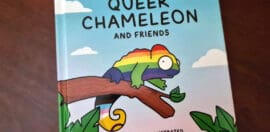First We Eat: Putting food sovereignty to the test

The Crocker Family in winter. Photo Credit: Alex Hakonson
10 March 2022 at 8:43 am
What happens when an ordinary family, living just south of the Arctic Circle, decides to live entirely locally for one year? Wendy Williams speaks to filmmaker Suzanne Crocker to find out.
In the summer of 2017, Suzanne Crocker set out to put food sovereignty to the test in Canada’s North.
Crocker, who switched careers from rural family doctor to filmmaker in 2008 and lives with her family in Dawson City, Yukon, banned all store-bought food from the house for one year.
She fed her (somewhat reluctant) family of five, only food that could be hunted, fished, gathered, grown or raised around her community, and filmed the whole thing, resulting in the documentary First We Eat.
While convincing her three sceptical teenagers to join her proved challenging, and replacing the pantry staples we all take for granted – including oil, sugar, salt and vinegar – was not without difficulty, it’s fair to say her experiment was a success.
Through her experience she showed not only a determination to finish what she started, but also that eating 100 per cent locally is entirely possible – even in a climate such as the Yukon.
Her hope now is that First We Eat, which is currently showing as part of the Transitions Film Festival, prompts audiences to question their own eating habits, and ultimately think about where their food comes from.
See also: Films to help us to envision a better world
“I think if the pandemic has taught us anything, it is understanding the vulnerabilities of long supply chains and long food chains, and how important it is to be able to turn to our own communities when there is a crisis,” Crocker tells Pro Bono News.
“If we can feed ourselves, take care of ourselves, then that’s so valuable.
“And then the luxury items that might grow on the other side of the world become just that, luxury items. If you can get them great, what a treat, but you don’t need them to survive.”

Suzanne Foraging. Photo compliments of Suzanne Crocker.
She says she was surprised at how adaptable she became, learning to live without foods she had previously depended on.
“I had thought that I would really struggle without caffeine, without chocolate, without salt – three staples in my life before that – but I was amazed. After the first couple of months I didn’t actually miss them, I was totally fine,” she says.
“I also learnt that I do better with less choice, and I really love having all my food under my roof, not having to go grocery shopping.
“When you have what feels like a store with an endless supply of an endless amount of things – which isn’t really the case, but that’s what it sometimes feels like – then figuring out what to cook just feels overwhelming. But give me just these things under my roof, now I can get creative.”
Crocker, who continues to eat 90 per cent local today, is keen to reassure audiences that eating locally isn’t as difficult as you might suppose – or potentially as hard as it looked in the film.
In First We Eat it was her first time trying to eat exclusively local food, and she “took it on in spades” resulting in an overwhelming amount of work
“Now it is not so bad,” she says. “I work Monday to Friday 9-5, and I can still do all of this. It is a little bit extra work in the fall, but once you learn and you get into routines, it’s not so bad.
“That’s one of the things I wish I could have shown in the film somehow, a look to the future, because I think sometimes at the end of the film, people think ‘wow that was very inspiring but there’s no way I could do anything close to that’.
“It’s about having routines; milk comes in, you skim off the cream, you make the ice cream, you make the yoghurt, you have things for the week. But it’s not overly onerous, and I don’t have to go to the grocery store. So I think it all evens itself out.”
For Crocker’s part, she was first prompted to think about where her food came from after a landslide cut her town off a few years ago.
She came to realise how dependent her community was on food being brought into Dawson City, which has a population of around 1,500 people. But she knew it hadn’t always been that way.
“Indigenous folks here ate entirely locally off the land, long before colonisation,” Crocker says.
“Dawson used to produce 97 per cent of its own food, and now we’ve done this about-switch where 97 per cent of our food is trucked in from far, far away.”
While she imagined it would still be possible to eat locally, she wanted to put it to the test.
Rather than research the issue, she figured the best thing would be to try it herself.
“Because I am not an expert in any food field. I’m not a good cook, I’m not a great gardener, I don’t come in with a whole bunch of knowledge, so I thought it would be good to see if I could do it, making use of what my community can also provide,” she says.

Farmer canoeing hay in winter. Photo compliments of Suzanne Crocker.
Reflecting on her experience, Crocker says she was surprised to discover just how much was produced in her local community.
“I was amazed at the variety that can be produced here and at the resourcefulness of the people who produce food,” she says.
“I didn’t know we had dairy cows for example, I didn’t know there was somebody raising sheep down river, with no road access. I didn’t know there were all these berry farmers.
“I had this little glimpse of the summer farmer’s market in Dawson but I certainly wasn’t aware of the extent.”
The film is very much a celebration of community, with the people of Dawson shown rallying around Crocker to help her succeed in her experiment.
For Crocker, there are a number of issues that interconnect with food sovereignty.
Whether you are concerned with community – knowing where your food comes from and valuing the land and the people who produce it – sustainability, the nutritional value of your food, a finite oil supply, your carbon footprint or food costs, it is an issue that affects us all.
Crocker says we should all be paying more attention to where our food comes from, how it is produced and who produces it.
“When you have a connection to your food, you have a connection to the people who produce it, the animals that are harvested and to the land that ultimately provides it, then you value those things,” she says.
“It makes us want to protect the environment, the land, the farmers, Indigenous knowledge, the animals, the ecosystems. And of course that is critical for our sustainability as a species on the planet.”
She believes that if she can eat locally in Dawson City – which has a 66-day growing season – then it should also be doable in other parts of the world, that goes for Australia.
“In Australia, your growing season is really long and there are so many things that you can produce in Australia,” she says.
“I hope that by watching this film, people will think wow, what bounty we have in Australia, let’s make the most of that, and why do we need to ship anything here?”
“In the Yukon the question is ‘What can we grow?’ In Australia, I feel the question is ‘What can’t we grow?’”
For anyone wanting to put food sovereignty to their test in their own lives, the film website has a page dedicated to what people can do, with 13 steps ranging from very small to much bigger.
For more information about First We Eat visit the website.
Watch the trailer below:
The film is currently being shown as part of the Transitions Film Festival.
As a proud partner of #TFFest22, Pro Bono Australia is excited to be co-presenting the film First We Eat.







